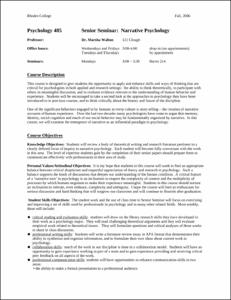Please use this identifier to cite or link to this item:
http://hdl.handle.net/10267/3589| Title: | PSYC 485-02, Senior Seminar: Narrative Psychology, Fall 2006 |
| Authors: | Walton, Marsha D. |
| Keywords: | Psychology, Department of;Syllabus;Curriculum;Academic departments;Text;2006 Fall |
| Issue Date: | 29-Aug-2006 |
| Publisher: | Memphis, Tenn. : Rhodes College |
| Series/Report no.: | Syllabi CRN |
| Abstract: | Course Description This course is designed to give students the opportunity to apply and enhance skills and ways of thinking that are critical for psychologists in both applied and research settings: the ability to think theoretically, to participate with others in meaningful discussion, and to evaluate evidence relevant to the understanding of human behavior and experience. Students will be encouraged to take a second look at the approaches to psychology they have been introduced to in previous courses, and to think critically about the history and future of the discipline. One of the significant behaviors engaged in by humans in every culture is story-telling – the creation of narrative accounts of human experience. Over the last two decades many psychologists have come to argue that memory, identity, social cognition and much of our social behavior may be fundamentally organized by narrative. In this course, we will examine the emergence of narrative as an influential paradigm in psychology. Course Objectives Knowledge Objectives: Students will review a body of theoretical writing and research literature pertinent to a clearly defined focus of inquiry in narrative psychology. Each student will become fully conversant with the work in this area. The level of expertise students gain by the completion of their senior papers should prepare them to communicate effectively with professionals in their area of study. Personal Values/Attitudinal Objectives: It is my hope that students in this course will work to find an appropriate balance between critical skepticism and respectful appreciation of theory and research in psychology. Such a balance supports the kinds of discussions that deepen our understanding of the human condition. A critical feature of a ‘narrative turn’ in psychology is an inclination to respect the complexity of context and the multiplicity of processes by which humans negotiate to make their experience meaningful. Students in this course should nurture an inclination to tolerate, even embrace, complexity and ambiguity. I hope the course will feed an enthusiasm for serious discussion and hard thinking that will outgrow our classroom and will continue to flourish after graduation. Student Skills Objectives: The student work and the use of class time in Senior Seminar will focus on exercising and improving a set of skills used by professionals in psychology and in many other related fields. Most notably, these will include: critical reading and evaluation skills: students will draw on the library research skills they have developed in their work as a psychology major. They will read challenging theoretical arguments and they will evaluate empirical work related to theoretical issues. They will formulate questions and critical analyses of these works to share in class discussion. professional writing skills: Students will write a literature review essay in APA format that demonstrates their ability to synthesize and organize information, and to formulate their own ideas about current work in psychology. collaboration skills: much of the work in our discipline is done in a collaboration model. Students will have an opportunity to gain experience working as part of a team and to gain experience providing and receiving critical peer feedback on all aspects of the work. professional communication skills: students will have opportunities to enhance communication skills in two areas: • the ability to make a formal presentation to a professional audience. • the ability to contribute to conversations (in-class, in out-of-class informal meetings, and in an on-line forum) that encourage the thoughtful expression of different points of view and that deepen our mutual understanding of the work we are doing. |
| Description: | This syllabus was submitted to the Office of Academic Affairs by the course instructor. |
| URI: | http://hdl.handle.net/10267/3589 |
| Appears in Collections: | Course Syllabi |
Files in This Item:
| File | Description | Size | Format | |
|---|---|---|---|---|
| 2006_fall_PSYC_485-02.pdf | 85.31 kB | Adobe PDF |  View/Open |
Items in DSpace are protected by copyright, with all rights reserved, unless otherwise indicated.